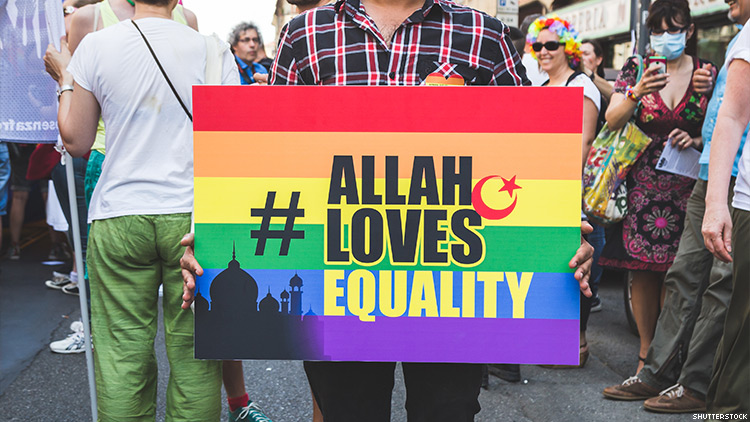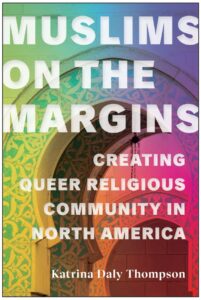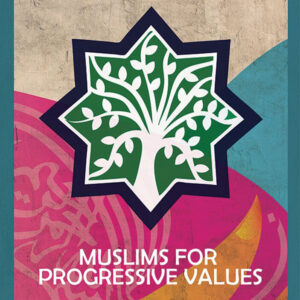Breaking Down Gender Binaries, Building Muslim Community
Transgender and nonbinary Muslims are creating welcoming spaces and transforming Islam

(Image source: Shutterstock)
When I converted to Islam in 2009, I was eager to find a queer and feminist Muslim community. I was lucky to discover Muslims for Progressive Values (MPV), where I soon became an active member in its Los Angeles chapter and in its Facebook group, which today boasts close to 20,000 members globally. But when I moved to Madison, Wisconsin, in 2013, I did not find the same kind of inclusive Muslim community. I became more active in online Muslim groups, getting to know many queer and trans Muslims (and those in solidarity with us) worldwide. Those connections proved invaluable when, three years later, I began to research North American Muslims I consider “nonconformists”—those who are marginalized in most Muslim communities for various reasons, including gender and sexual identity.
Many Muslims I have gotten to know have talked about the importance of finding inclusive communities for their sense of wholeness and acceptance as Muslims, much as I experienced when I first found MPV. One Friday in 2017, I had lunch with Mahdia, a white-presenting American convert and a woman of trans experience, at a Chicago diner before Friday prayers at Masjid-al-Rabia, the LGBTQ-affirming mosque she had helped found the previous year. As we ate, Mahdia told me about her first experience sharing physical space with other queer and trans Muslims at a retreat: “Before that moment, I had known hypothetically that LGBT Muslims exist and this is okay, and there is family. . . . But it took to actually be there and to not just see the theory of it. To see those possibilities in action was really phenomenal.”
For the past six years, I’ve been meeting with and interviewing Muslims like Mahdia throughout North America in person and online. I am sharing the stories of three such Muslims—Salma, Keegan, and Ameera—here. Each was involved in inclusive Muslim communities where marginalized Muslims could practice Islam together. As in my forthcoming book Muslims on the Margins: Creating Queer Religious Community in North America (due out from NYU Press in early 2023), I use a mix of pseudonyms and real names, depending on participants’ preference, but without indicating which is which.
 The issues facing trans, nonbinary, and queer Muslims are multiple and complex. Many Muslim religious spaces are gender-segregated, making them unwelcoming to trans and nonbinary Muslims. In countless places today, trans and nonbinary Muslims could be refused entry to mosques, told to pray in an area that does not correspond to their gender, or denied Islamic funeral rites. For example, Ameera told me she was kicked out of a mosque in Wisconsin because she tried to pray in the women’s section. The other women realized she was trans and had her removed.
The issues facing trans, nonbinary, and queer Muslims are multiple and complex. Many Muslim religious spaces are gender-segregated, making them unwelcoming to trans and nonbinary Muslims. In countless places today, trans and nonbinary Muslims could be refused entry to mosques, told to pray in an area that does not correspond to their gender, or denied Islamic funeral rites. For example, Ameera told me she was kicked out of a mosque in Wisconsin because she tried to pray in the women’s section. The other women realized she was trans and had her removed.
In response to such problems, Salma, Keegan, and Ameera have each contributed to inclusive communities where trans and nonbinary Muslims can be open about their religious and queer identities. They are part of a global network of nonconformist Muslims connected via Facebook groups and, for the past couple of years, Zoom meetings.
Most groups for nonconformist Muslims have made it clear that queer Muslims are welcome and fully accepted. The first rule in MPV’s Facebook group says that, “Bigotry, misogyny, and comments that are degrading to others with things like race, religion, culture, sexual orientation, gender identity will not be tolerated.” Those who violate such rules are quickly warned and, if they continue, are banned from the group. El-Tawhid Juma Circle (ETJC) Unity Mosque in Toronto, which has hosted LGBTQI-inclusive Jumas (congregational Friday prayers) every week since 2009, has similar rules which they post in their online group and read aloud at every meeting.
The groups I studied that had in-person meetings—like ETJC, the Atlanta Unity Mosque, and some MPV chapters—also reimagined Islamic practices so that everyone will feel included. In most Muslim communities, prayers are led by men, with male congregants in rows behind the imam (prayer leader) and women in rows behind the men, possibly in another room or even excluded altogether. In contrast, ETJC has encouraged women-led prayer for its mixed-gender congregation for many years as part of its commitment to feminist practice. And in 2019 when a congregant who had previously identified as a woman came out as nonbinary, the mosque quickly adjusted its language to refer to “non-male-led prayer.”
Another departure from Muslim norms is ETJC’s approach to ablution, the ritual washing that Muslims do before they pray (typically in gender-segregated bathrooms). Whereas in most settings, Muslims perform wudu, individual ablution with water, ETJC encourages congregants to practice tayammum or “dry ablution” as a group, which—alongside other possible benefits—means that trans or nonbinary participants do not have to enter gendered public bathrooms to achieve ritual purity before Juma.
Through both words and deeds, inclusive communities create space for people like Salma, Keegan, and Ameera to thrive. Their stories illuminate what is possible for a more accepting Muslim community and for queer, trans, and nonbinary Muslims.
Salma: Finding “Mecca Away from Mecca”
Salma (they/them) is an American-born Pakistani Shia Muslim in their mid-thirties who moved to Canada for graduate school when they married a Pakistani-Canadian Shia man in 2013. “Gender is super important to me,” Salma told me. “Gender identity is something that’s evolving. I think right now, I’m identifying as a nonconforming individual. I was identified as female at birth, [but] was never very good at being a woman, a girl, or whatever.”
As a teen in the northeastern U.S., Salma attended a gender-segregated Shia mosque. While Salma is confident that some of their friends at the mosque were “queer and gender nonconforming,” it was not something they felt safe openly discussing. While Salma was in college in the south, the Shia community was so small that the mosque had one prayer room for all and allowed families to sit together, rather than separating everyone according to gender. “I liked it a lot,” Salma said. “It made sense.”
When Salma went to Mecca, their perspective on gender segregation shifted more radically. Like most Muslims, Salma considered the pilgrimage (hajj) to Islam’s birthplace in Mecca a religious obligation and a once-in-a-lifetime experience. But what is radical about it is that, despite Saudi Arabia’s conservativeness, the number of people present makes gender segregation impossible to uphold. “There was nothing separating us,” Salma said. “Our gender identities didn’t matter; the fact that we were different sectarian affiliations didn’t matter.” After praying in Mecca, Salma said, “the gender segregation of these spaces here”—by which they meant most mosques—“just really didn’t sit well with me. … I don’t want to be separated from my husband just because he has a different gender identity in this room of strangers.”
In addition to being gender nonconforming, Salma is also out about being queer and polyamorous. When they came out to a gay friend in Toronto, he referred them to Salaam Canada, a support group for LGBTQ+ Muslims. In turn, they learned about El-Tawhid Juma Circle (ETJC). The first time Salma attended Juma there, during Pride, it was also the wedding of two of the mosque’s founders and leaders, El-Farouk Khaki and Troy Jackson.
“I was crying hysterically,” Salma told me. “I was uncontrollable with sobs because seeing their marriage ceremony for me was very healing, as someone who is queer-identified who was closeted my entire life, including to myself, to be able to see this. It was just like, wow. You know, Islam! And it’s in a masjid!” they exclaimed, using the Arabic term for mosque. “And we just prayed Juma, and I listened to a khutbah [sermon], you know?” Salma now regularly brings others to ETJC for Juma. “When they’re in that space for the first time, they just cry hysterically because there’s something so beautiful and so meaningful and authentic. It’s a taste of truth that you don’t get from … misogynistic masjids.”
While Salma finds it uncomfortable to pray as a Shia in mainly Sunni mosques, at ETJC Salma prays alongside people from various sectarian and non-sectarian backgrounds and regularly gives sermons or leads prayers for the congregation. It was only there that Salma had the “experience of the unity that comes up when there’s absolutely no barriers between individuals.”
“I didn’t have to look around [asking], ‘Where are other femme-identified folks going?’ I could just stay where I was and … pray right there between two masculine-presenting individuals. It reminded me of Mecca. … El-Tawhid Juma Circle is my Mecca away from Mecca.”
Keegan: “We Are God-Made Creatures”
Keegan (they/them) identifies as a queer immigrant, a refugee, and a war survivor. They are both Muslim and Jewish, raised in an interfaith family by atheist parents. Originally from Iraq, Keegan now lives in Southern California and is occasionally involved in the Los Angeles chapter of Muslims for Progressive Values (MPV).
 We first met in MPV’s Facebook group and eventually in person at the West Hollywood Pride parade. “Marching in the LA Pride, as a Muslim queer, with my crew, being pretty proud: that’s a big deal, you know,” Keegan said, laughing. “That was a really, really big deal.” Keegan sees the work of LGBTQ-inclusive Muslim groups like MPV as “the core or the original spirit of Islam, when Islam first came as a liberator from slavery, from manhood, from a sexist, racist society.” Here Keegan drew on a common discourse among progressive Muslims: Islam was originally a progressive religion and the Prophet Muhammad a feminist, an argument used to claim authenticity for what more conservative Muslims might see as deviance.
We first met in MPV’s Facebook group and eventually in person at the West Hollywood Pride parade. “Marching in the LA Pride, as a Muslim queer, with my crew, being pretty proud: that’s a big deal, you know,” Keegan said, laughing. “That was a really, really big deal.” Keegan sees the work of LGBTQ-inclusive Muslim groups like MPV as “the core or the original spirit of Islam, when Islam first came as a liberator from slavery, from manhood, from a sexist, racist society.” Here Keegan drew on a common discourse among progressive Muslims: Islam was originally a progressive religion and the Prophet Muhammad a feminist, an argument used to claim authenticity for what more conservative Muslims might see as deviance.
I asked Keegan about their “very non-Muslim name,” and they said, “It’s a chosen name. … My birth name was [a] very, very, very Arabic name,” Keegan said, laughing. “Very, very Muslim name,” one that Keegan felt didn’t represent them. “I identify as a non-binary, gender-nonconforming person,” they added. In contrast, Keegan’s birthname was a “strictly masculine male name. Keegan “is a more non-binary name. It’s also a nonreligious name, you know? I don’t think it’s fair that I am identifying with a specific name that is exclusively for one religion, one race, one gender, ‘cause this is not who I am. … I choose the name that I identify with.”
I told Keegan that when we first met online, I had assumed they were a convert because of their name. They laughed in response. “You can still call me a convert if you want to. ‘Cause I think the Islam I grew up practicing is not the Islam I believe in now.”
Keegan described the relationship between their queerness and religious beliefs and practices: “I think we are God-made creatures. So, we’re created by God; we are loved by God no matter what religion we are, we are God’s creation, so we should be proud. And the community must accept us whether they want to or not because we are not something abnormal or not natural. We’re pretty natural, pretty normal.” They continued, “Prophet Muhammad, peace be upon him, never prosecuted anyone for being homosexual. I dare any Muslim, any sheik, … any religious scholar to find one example of Muhammad prosecuting somebody for being homosexual. Prosecution came way after when Muhammad died. And that’s man-made laws; they were not God-made laws. … Nothing in Qur’an says, ‘Kill the homosexuals,’ nothing. It’s our book; it’s our constitution as Muslims, and … when we create ideas, we should go back to Qur’an and make sure that it is okay with God to make it.”
Ameera: “Fully Muslim and Fully Queer”
Ameera (she/her) is a Bengali child of immigrants in her late twenties, a transgender Muslim, and a lesbian-leaning bisexual with a strong theological background in Sunni Orthodox Islam. She is particularly proud of having memorized the entire Qur’an in 2009, an impressive feat highly valued in many Muslim communities. During our interview, Ameera told me, “I take a lot of that with me, that theological understanding, as I have learned to transform elements of orthodoxy into elements that are more progressive, inclusive, and … life-giving to me. … Parts of that also include liberation theology and social justice and activism.” Early in college, Ameera underwent what she calls “a transformation period”: “I was learning about my identity, as well as learning about the struggles of people with other marginalized identities.” Through what she calls a “one for all, all for one mentality,” Ameera was able to “learn and immerse into the world of … social justice activism” that is important to her today.
Before coming out as a trans woman, Ameera had gone through a period where she identified as a gay man, during which she began struggling with her religious identity. “Because I didn’t know how I could be gay and also a Muslim, right? And not just a Muslim but also someone who has worked their entire lives and built their identity about being a role-model Muslim. So, I had a lot of grief during that time … I would yell at God on my prayer [rug] and be like, ‘Allah, why did you make me this way? … Why are you giving me a test that I can’t bear?’”
In 2017, however, Ameera came out as a trans woman, began using she/her pronouns, and became more comfortable with herself. “Part of me misses the male privilege that just comes with being male,” she said, laughing, “but part of me is so, so, so grateful for everything, for all of the really insightful and powerful activist voices and spaces that I’ve been connected to, because, I learned through … being trans … what oppression looked like.”
During college, Ameera was active in interfaith groups. After she moved to Madison, Wisconsin, she became involved in ETJC’s Facebook group, where she and I first met. She and I eventually co-founded a Madison chapter of ETJC, which we led together until she moved away.
Now married to a convert and living in Minnesota, Ameera says, “My Muslim community is where I feel the most safe, … held, and authentic,” especially in “queer-Muslim-centered spaces.” ETJC’s online group, she told me, “has been a space where I have really been able to feel like myself and also fully Muslim and fully queer.” Other communities that have been important to her are the Facebook group Radical Muslims and the Muslim Youth Leadership Council. “It was life-changing,” she said, “to be connected with all these other queer Muslims,” and “also learn what activist spaces look like.”
Finding an online community with whom to pray Juma has been critical to Ameera. “I would prefer to have a brick-and-mortar masjid,” she says, but, “I think the people make up more substance than the material.”
***
As Salma’s, Keegan’s, and Ameera’s experiences reveal, finding or helping to create inclusive communities is essential for trans and nonbinary Muslims to feel like themselves and to honor their entire identities. It is challenging enough to be a Muslim in a largely non-Muslim society, but it is more so when one does not conform to gender or sexual norms. Both Muslims and non-Muslims alike have much to learn from the experiences of trans and nonbinary Muslims, who reveal what a more inclusive Muslim community might look like and why it is so badly needed.
Katrina Daly Thompson (they/them) is Evjue-Bascom Professor of the Humanities and Professor of African Cultural Studies at the University of Wisconsin-Madison, with affiliations in Anthropology, Religious Studies, and Gender and Women’s Studies. Their book Muslims on the Margins: Creating Queer Religious Community in North America is due out from NYU Press in early 2023.